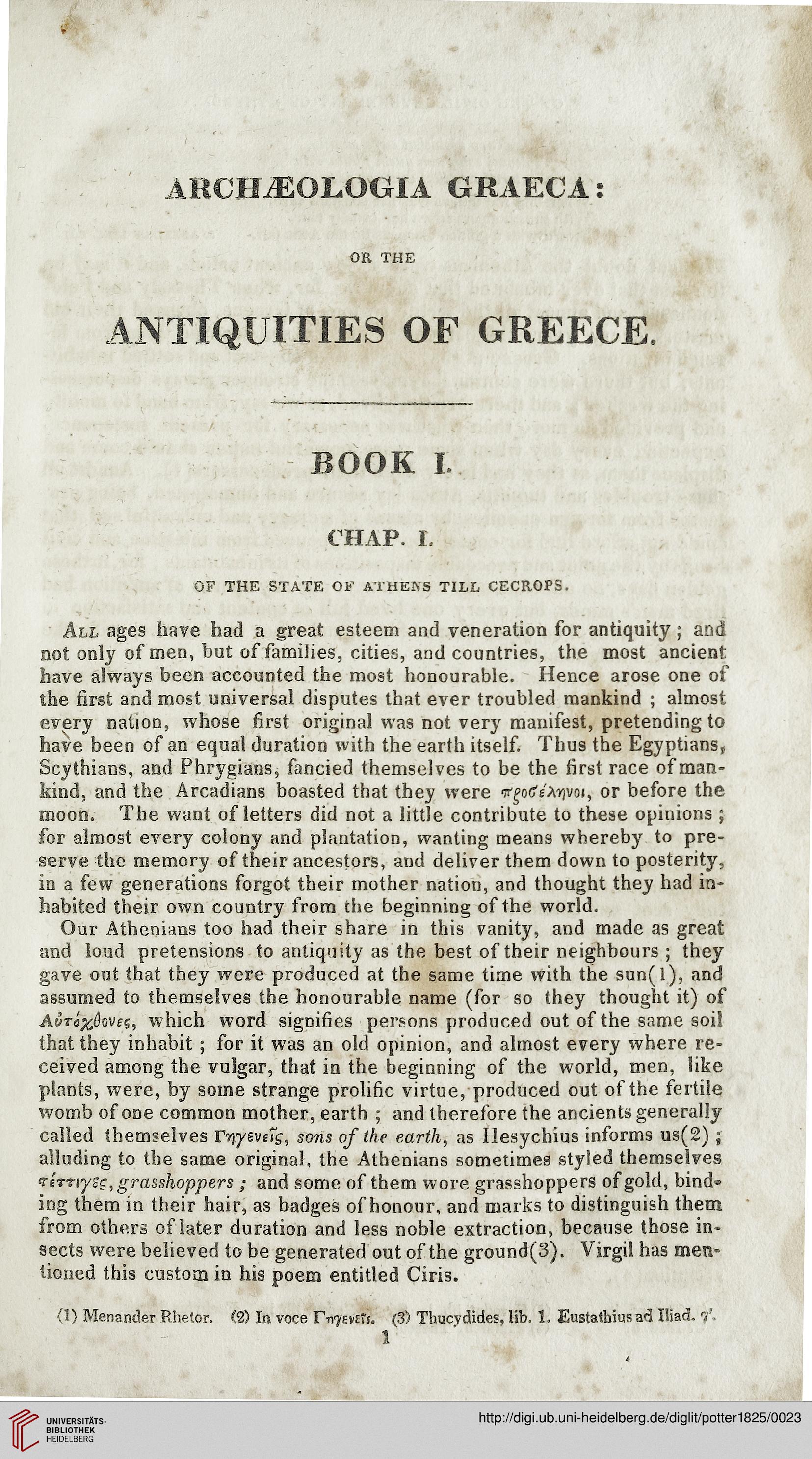AMCHiEOLOGIA GRAECA:
or the
ANTIQUITIES OF GREECE.
BOOK t.
CHAP. I.
of the state of athens till cecrops.
All ages hare had a great esteem and veneration for antiquity ; and
not only of men, but of families, cities, and countries, the most ancient
have always been accounted the most honourable. Hence arose one of
the first and most universal disputes that ever troubled mankind ; almost
every nation, whose first original was not very manifest, pretending to
have been of an equal duration with the earth itself. Thus the Egyptians,
Scythians, and Phrygians, fancied themselves to be the first race of man-
kind, and the Arcadians boasted that they were tfgotfe'xrim, or before the
moon. The want of letters did not a little contribute to these opinions ;
for almost every colony and plantation, wanting means whereby to pre-
serve the memory of their ancestors, and deliver them down to posterity,
in a few generations forgot their mother nation, and thought they had in-
habited their own country from the beginning of the world.
Our Athenians too had their share in this vanity, and made as great
and loud pretensions to antiquity as the best of their neighbours ; they
gave out that they were produced at the same time with the sun(l), and
assumed to themselves the honourable name (for so they thought it) of
Awra^ovfs, which word signifies persons produced out of the same soil
that they inhabit ; for it was an old opinion, and almost every where re-
ceived among the vulgar, that in the beginning of the world, men, like
plants, were, by some strange prolific virtue, produced out of the fertile
womb of one common mother, earth ; and therefore the ancients generally
called themselves rryyevtig, sons of the earth, as Hesychius informs us(2) ;
alluding to the same original, the Athenians sometimes styled themselves
Temysg, grasshoppers ; and some of them wore grasshoppers of gold, bind-
ing them in their hair, as badges of honour, and marks to distinguish them
from others of later duration and less noble extraction, because those in-
sects were believed to be generated out of the ground(3). Virgil has men-
tioned this custom in his poem entitled Ciris.
(1) Menander Rhetor. (2) In voce r^Evm. (3) Thucvdides, lib. 1. Eustatbius ad Iliad, f.
1
or the
ANTIQUITIES OF GREECE.
BOOK t.
CHAP. I.
of the state of athens till cecrops.
All ages hare had a great esteem and veneration for antiquity ; and
not only of men, but of families, cities, and countries, the most ancient
have always been accounted the most honourable. Hence arose one of
the first and most universal disputes that ever troubled mankind ; almost
every nation, whose first original was not very manifest, pretending to
have been of an equal duration with the earth itself. Thus the Egyptians,
Scythians, and Phrygians, fancied themselves to be the first race of man-
kind, and the Arcadians boasted that they were tfgotfe'xrim, or before the
moon. The want of letters did not a little contribute to these opinions ;
for almost every colony and plantation, wanting means whereby to pre-
serve the memory of their ancestors, and deliver them down to posterity,
in a few generations forgot their mother nation, and thought they had in-
habited their own country from the beginning of the world.
Our Athenians too had their share in this vanity, and made as great
and loud pretensions to antiquity as the best of their neighbours ; they
gave out that they were produced at the same time with the sun(l), and
assumed to themselves the honourable name (for so they thought it) of
Awra^ovfs, which word signifies persons produced out of the same soil
that they inhabit ; for it was an old opinion, and almost every where re-
ceived among the vulgar, that in the beginning of the world, men, like
plants, were, by some strange prolific virtue, produced out of the fertile
womb of one common mother, earth ; and therefore the ancients generally
called themselves rryyevtig, sons of the earth, as Hesychius informs us(2) ;
alluding to the same original, the Athenians sometimes styled themselves
Temysg, grasshoppers ; and some of them wore grasshoppers of gold, bind-
ing them in their hair, as badges of honour, and marks to distinguish them
from others of later duration and less noble extraction, because those in-
sects were believed to be generated out of the ground(3). Virgil has men-
tioned this custom in his poem entitled Ciris.
(1) Menander Rhetor. (2) In voce r^Evm. (3) Thucvdides, lib. 1. Eustatbius ad Iliad, f.
1





